Tuesday, July 9, 2024. Annette’s News Roundup.
The New York Times, which issued the first call for the President to step down, reported this. 👇
Parkinson’s Expert Visited the White House Eight Times in Eight Months.
The White House said President Biden had met with a neurologist only three times in more than three years in office. But it would not say whether the visiting expert was consulting with the president’s physician about his health.
— — The Times treated the neurologist story as a scoop, strongly implying that the White House was hiding information about the President and his health.
The panic the Times article caused was responsible for the brouhaha that occurred at the White House yesterday afternoon at the White House Press briefing.
Touch to watch what Karine Jean-Pierre, the President’s Press Secretary, had to endure.
https://x.com/acyn/status/1810391291789979827?s=61&t=I_Od53CbnPTsbLcD0baXPg
Last night, the White House made clear what was really happening about this neurologist.
Yes, the neurologist saw the President only once this year and once each of the previous years, in connection with the President’s annual physical.
But the neurologist visited the White House 8 times this year because he also services the White House staff and over 1,000 members of the military who receive medical care in the White House. He only saw the President once this year, as the White House had said from the start.
As of the end of day on Monday, July 8th, Joe Biden is our candidate, whether the New York Times likes it or not.
You may recall that, in her Guardian article posted in Monday’s Roundup , Rebecca Solnit warned, “Media is right now campaigning hard for a Democratic party loss.”
Yesterday, that seemed more true than ever.
If you expect the Times to apologize for their false step in reporting inaccurately about the neurologist, think again. The Times wrote a second editorial yesterday, calling for the President to step down. 👇
The Democratic Party Must Speak the Plain Truth to the President.
Today, we can be sure that this mad situation will continue too, with some, including the New York Times, trying to push Joe to step down, and in doing so, continuing to keep attention off the convicted felon and would-be dictator Donald Trump.
Worry Less. Do More.
The Democratic Party remains split wide open.
Simon Rosenberg, known far and wide as a committed Biden man, earlier in the day yesterday, summarized why he is now worrying.
His words yesterday show the frenzy the Times reporting caused.

As people in this community know, I have been all in for Joe Biden. 100%. He has been a very good and successful President in a time of enormous challenge. The country is far better off today due to his grit, fierce determination, and willingness to go out there every day, with the intensity of a far younger man, and fight for all of us. I am proud of him, of his Presidency, and what will be a powerful and inspiring legacy no matter what happens. I was an early Biden supporter and frankly his Presidency has been far more successful and consequential than I could have imagined during the COVID-laden Democratic Primary of 2020. We are lucky that he choose to run in 2019 and lucky to have had him as President in a time of such enormous challenge.
But I am, frankly, alarmed at how the White House has handled legitimate questions about his health and debate performance in recent days. I have been inundated with messages from medical professionals in the Hopium community who believe the President is showing clear signs of decline brought by a neurological condition like Parkinson’s. What we’ve gotten from the White House is that his February physical showed no signs of a neurological condition, and there are no plans to update that finding with new post-debate neurological tests. I find this answer to be unsatisfactory and a bit hard to believe. Clearly the President has to go through a comprehensive set of new tests. As someone who is going through a close relative’s decline due to Parkinson’s right now, I can attest that decline can be very rapid, and that five months can be an eternity. Relying on a February diagnosis given what we’ve seen with our own eyes, what we know about the devastating nature of some of these conditions, and what we know about the gravity of this political moment is just not acceptable.
This is not about Joe Biden’s age. This is about getting clarity about whether he will be able to serve another four years. There cannot be and should not be any doubt or confusion about this, and a February diagnosis simply doesn’t cut it. The people of America, the people of our NATO allies, and the people of the world need more and better answers from Joe Biden and his family about his health and capacity to serve.
(Hopium Chronicles).
I wonder if Simon Rosenberg, previously, the most optimistic cheerleader for the President, now having heard the explanation from the White House about the neurologist, still feels hesitant about Joe. Stand by. You will hear tomorrow.
Pennsylvania’s Senator John Fetterman has never wavered.
Sen. Fetterman: “There is only one person in this room that kicked Trump's ass in an election. There is only one person in this state that has kicked Trump's ass in an election. There is only one person in the country that's ever kicked Trump's ass in an election, and that is your president.”
https://x.com/johnfetterman/status/1810076763856207949?s=61&t=I_Od53CbnPTsbLcD0baXPg
Representative Maxine Waters also hasn’t wavered. Nor has Leader Hakeem Jeffries. Nor has Senator Elizabeth Warren. We could go on and on.
This CNN Poll👇 probably tells us nothing about what might happen on November 5, but here it is.
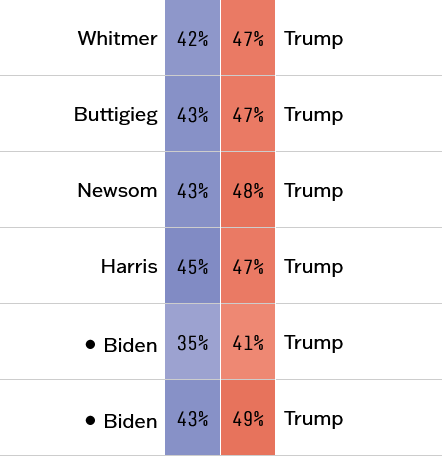
As you saw, 👆 the Vice President leads the pack when up against Trump.
The Vice President, of course, stands firmly with President Biden.
That said, here again, is another look at the Vice President, so that you will know Kamala Harris, whenever she does run for President.
Recently in the Washington Post, Jennifer Rubin wrote a column on the Vice President.
It was first posted on the Roundup on July 1st.
A closer look at Harris shows how effective she’s become
On Friday, after the Supreme Court issued its latest batch of opinions, I spoke briefly on the phone with Vice President Harris. After several days spent attending her appearances, it had become obvious to me that far from being a liability, as her critics insist, she is an effective communicator and skilled advocate — especially on causes on which she has developed expertise over decades.
Given the recent court scandals, I asked her about ethics reform. Even when in the Senate, she recalled, she supported a code of ethics for the Supreme Court. “The reasons are more evident today, ” she said.
She pointed to blindfolded Lady Justice. “This is how ingrained it is in our system of justice,” she added. “I’m concerned there has been loss of confidence” in the court, Harris said, highlighting not only ethics concerns but also the extreme ideology of a court that has shredded precedent.
From there she spoke passionately about her work since Dobbs to defend reproductive freedom.
According to her office, since that decision, she has delivered scores of speeches and held more than 90 gatherings in 21 states (as well as convening groups at the White House) to discuss reproductive freedom with elected officials, health-care providers, faith leaders, students, and advocates. On her Fight for Our Freedoms College Tour, beginning in 2023, she raised the issue at college campuses.
Harris told me her campus visits have been standing room only, with overflow rooms. “Students stood in line for hours,” she said, “not for a rock concert, but to have a conversations with the vice president.”
Contrary to the impression that Gen Z voters are disengaged, she came away “inspired” and more certain that they will mark a “sea change” in politics. Guns, abortion rights and climate are not academic issues to this generation. “It is a lived experience. In the height of their reproductive years, the Supreme Court took away the right to make decisions about their own body. . . . They understand we need practical solutions.”
Observing Harris last week, I could see the extent of her political maturation since her first year in office, when withering and often baseless criticism dominated coverage. Her delivery is crisp and authoritative. She appears relaxed, confident and centered in formal and informal settings. And she appears to relish taking on bullies.
She can draw on not only three years of experience as vice president but 20 years or so as a prosecutor. “There are very few things I do now that I have not done over [that time],” she told me, pointing to a career that’s ranged from working as a line prosecutor to running the San Francisco agency for abused and neglected children to serving as California Attorney General and then its senator.
Certainly, since Dobbs, she has been channeling righteous anger and wielding a sharper message, acting as the most active and effective administration voice on the subject. To mark Dobbs’s second anniversary, the administration unsurprisingly has put her front and center. She has never been under any illusion that the court would stop at abortion. In the decision, she told me, “Clarence Thomas said the quiet part out loud.” He and other justices have their eye on Griswold (contraception) and Obergefell (same-sex marriage).
On Thursday, appearing with Chrissy Teigen at an event for abortion providers and activists, Harris decried the Supreme Court that “took a constitutional right away.”
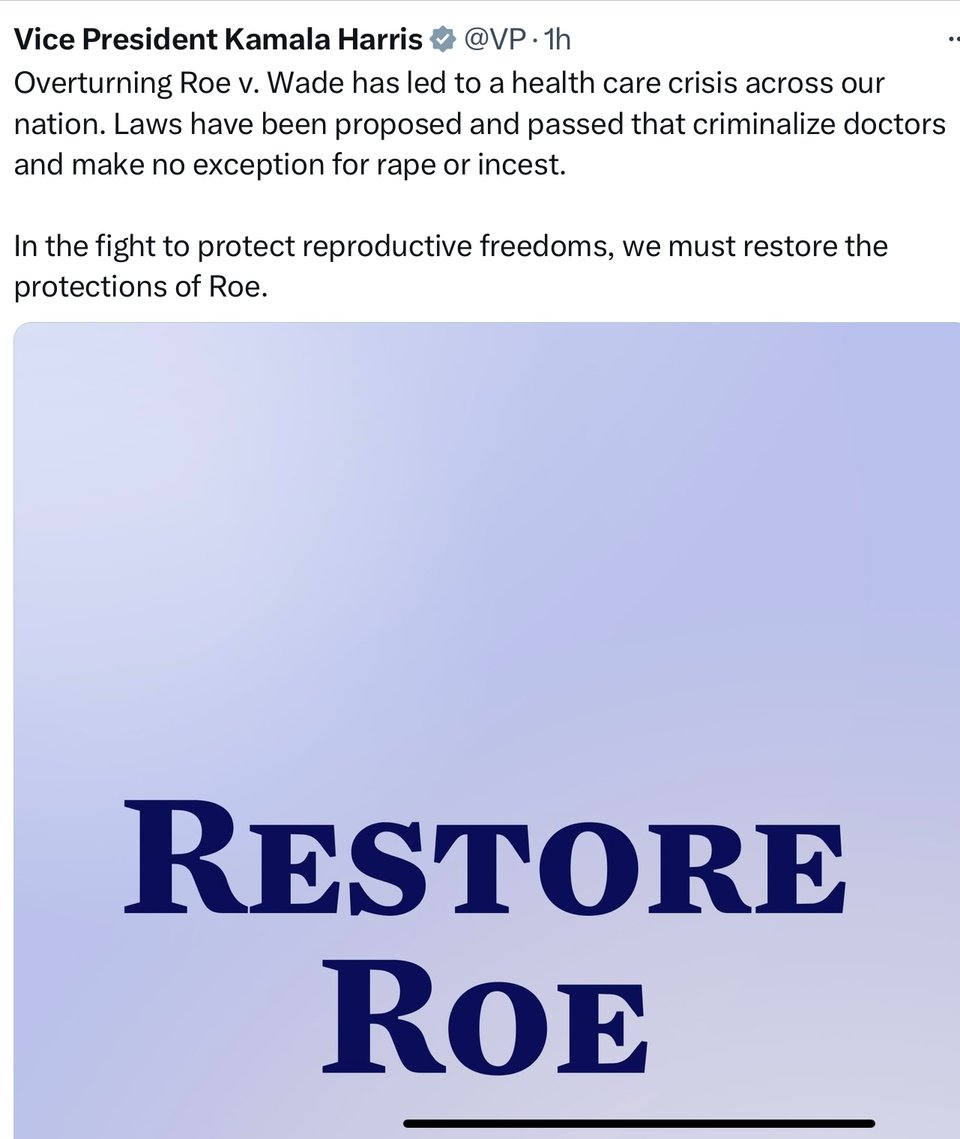
In a conversational setting, she stressed that Trump intentionally appointed justices to undo Roe and “they did as he intended.” She blasted “Trump abortion bans,” including many that tell a rape survivor “who has had a violation of their body that she has no right to make a decision about what comes next. … That’s immoral,” Harris declared indignantly.
She cited her own visit to an abortion clinic, which, she had observed, treated patients with dignity and respect, and her push to expand from three to 46 states, Medicaid coverage of postpartum care. But she also deftly told an audience of progressives, “We need to renew our commitment to coalition building.” Pointing to the overlap of states that restrict voting, deny LGBTQ+ rights and ban abortions, she reminded attendees: “It’s all about the dignity of all people.”
With some progressives tempted to squabble among themselves, just five months before the election, her message was timely, including a warning that “all of the residual effects [of Dobbs] are yet be found.” Monday, she will be appearing at Dobbs-related events in Arizona and Maryland. Harris’s skill in connecting personal experience to the law works well in other contexts, too. At an emotionally charged gathering on Monday, for example, she rolled out a White House initiative to hold accountable combatants using rape as an instrument of war.
Harris presented a commanding figure at a lectern in an Executive Office Building auditorium packed with survivors and activists. There, she balanced empathy (“My heart breaks for the trauma and pain inflicted in each of these conflicts”) with a dignified legal presentation that kept the event from turning maudlin or appearing exploitive.
She stressed that “sexual violence has been a tactic of war since ancient times … [as] those who have waged war have specifically targeted and violated women and girls to exert dominance and power over their bodies and to humiliate and terrorize and subdue entire populations.” Reminding the audience of her prosecutorial backstory, she argued that the United States must deploy “all of our diplomatic, financial, and legal tools to punish those who commit sexual violence.” She continued, “We must condemn, of course, this conduct. But there must be accountability.”
Laying out the administration’s commitment “to move the system from only condemnation to consequences,” she noted that the White House “imposed sanctions based solely on conflict-related sexual violence, including for crimes committed in Haiti, Sudan, Iraq, and the [Democratic Republic of Congo], with the knowledge that meaningful systems of accountability also contribute to deterrence.” She specifically highlighted Hamas’s systematic sexual violence against Israeli women. Effectively rebuking months of protests that often devolved into rank antisemitism and denial of Hamas’s atrocities, Harris vividly recounted:
In the days after Oct. 7, I saw images of bloodied Israeli women abducted. Then it came to light that Hamas committed rape and gang rape at the Nova Music Festival, and women’s bodies were found naked from the waist down, hands tied behind their back, and shot in the head. She personalized the unimaginable horrors personal in describing her meeting with a survivor, Amit, “who has bravely come forward with her account of sexual violence while she was held captive by Hamas.” (Amit later detailed her ordeal.) Harris then delivered her closing argument: “The use of sexual violence as a tactic of war is unconscionable.” (After victims spoke, Sheryl Sandberg presented her horrifying “Screams Before Silence” documentary.)
Political media largely underplays the vice president’s role in the campaign and specifically her task in reaching out to critical Democratic constituencies. But her political strength is not lost on the Biden team — as a senior aide exiting the gate on Monday acknowledged to me — which now deploys her during event-packed weeks.
This past week alone, Harris’s schedule included a quick trip to Switzerland; her Monday event; a gun-safety appearance and Juneteenth celebration in Atlanta; abortion events back in D.C.; and finally, a New York speech to the largest hospitality union. As is true with the entire campaign, the voters most enthusiastic about Harris are those who are most engaged.
Now, the campaign must ensure the entire electorate gets to see what those watching her up close have observed: a formidable candidate. (Jennifer Rubin,The Washington Post, June 23, 2024).
Here’s the New York Times yesterday.
- The Reintroduction of Kamala Harris
Vice President Kamala Harris has spent the past year trying to quiet her doubters. Now, with President Biden’s candidacy on the line, Democrats are assessing whether she is up to being the nominee.
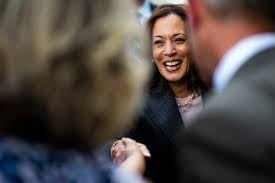
By early this year, around the time a prosecutor called President Biden a “well-meaning, elderly man with a poor memory,” Vice President Kamala Harris already knew something had to change.
It was up to her, she had told allies, to finally distinguish herself in her job — something she had been struggling to do for more than two years — and reassure American voters that the Biden-Harris ticket was still a safe bet. She had been feeling sidelined in the early stages of the campaign, one adviser said, and she wanted a bigger role.
She fled the Washington bubble and embarked on an ambitious travel schedule, making more than 60 trips this year alone. She tossed talking points to speak out more forcefully on abortion rights, the war in Gaza and race. She invoked her personal story more often, from her mother’s influence on her life to her inspiration for becoming a prosecutor.
Her allies emphasize that she has been taking on a bigger role for some time, notably after the Supreme Court overturned Roe v. Wade two years ago and during high-profile foreign assignments. But even before the questions about Mr. Biden’s age and acuity burst into the open, people close to her say, she was looking for more powerful ways to support the ticket.
Now, the effort to reintroduce herself has reached its most critical moment, with Mr. Biden’s candidacy plunged into crisis after a devastating debate performance in Atlanta and Democrats seriously weighing the prospect that she could become the nominee.
And while Ms. Harris, 59, has shown steadfast support for Mr. Biden in the frenzied week since the debate, her allies insist she is the only logical choice to lead the ticket if he steps aside.
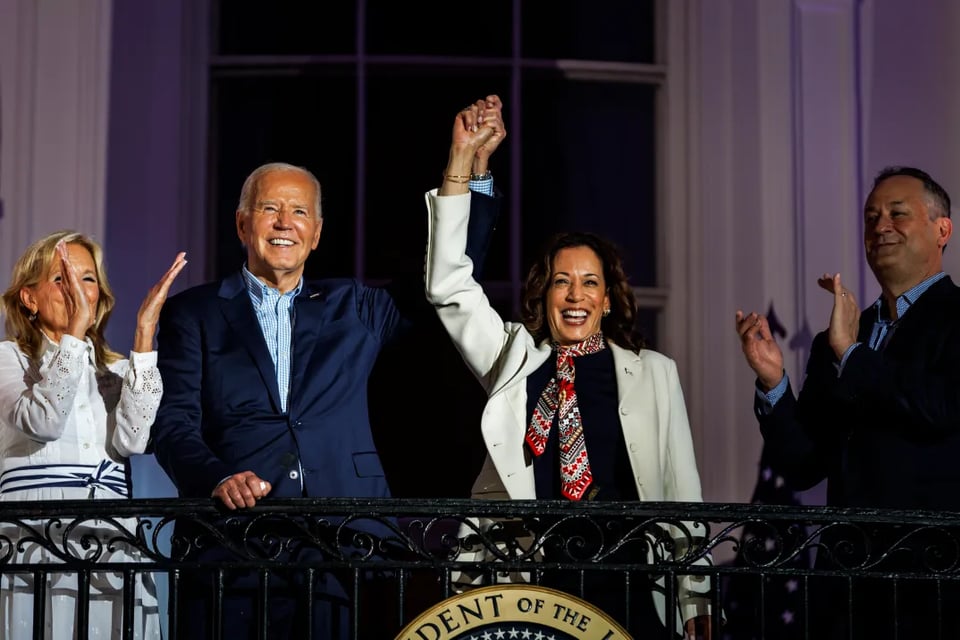
Ms. Harris and President Biden celebrated the Fourth of July at the White House on Thursday. Many allies believe she is the only logical choice to lead the Democratic ticket if the president were to step aside.
Representative James E. Clyburn, the South Carolina Democrat who is widely credited for reviving Mr. Biden’s 2020 campaign, said in an interview this week that he would support Ms. Harris should the president bow out. He threw cold water on any alternative.
“This party should not, in any way, do anything to work around Ms. Harris,” he said.
Ms. Harris declined to be interviewed for this article.
But many Democrats acknowledge that having her at the top of the ticket comes with substantial risks. Her 2020 presidential campaign unraveled swiftly, raising questions about her strength as a candidate. Even Mr. Biden, early in his presidency, described her as a “work in progress.” And Democrats have expressed concerns at times that she struggled to convey publicly that she was in command of the issues.
“Things have gotten better for her,” said the longtime Democratic political strategist Robert M. Shrum. “And she’ll get a second look. She has to live up to that second look.”
Although a CNN poll found that Ms. Harris was two percentage points ahead of Mr. Biden in a hypothetical contest against Mr. Trump, she still lost to Mr. Trump in the survey.
In recent days, the Trump campaign and Republican critics have amped up their attacks on her, hinting at how a Harris candidacy could lead to even more of the kinds of racist and sexist assaults that she has been fending off during her time as vice president.
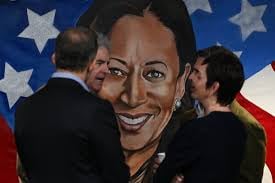
A mural of Ms. Harris at the Biden-Harris campaign headquarters in Wilmington, Del. Democratic leaders say choosing any other candidate could alienate vital constituencies who helped elect Mr. Biden in 2020.
Yet Democratic leaders say choosing any other candidate could alienate vital constituencies, including Black women, who helped carry Mr. Biden to the White House in 2020. Uniting quickly behind one person would also avoid a wide-open convention in Chicago next month.
One major Democratic donor, Steve Phillips, a San Francisco lawyer, said that downplaying Ms. Harris as a possible replacement for Mr. Biden was “implicit bias and racism and sexism.”
“She’s the vice president of the United States, which for the past 50 years of this country has been heir apparent,” he said in an interview. “So it’s unseemly at best that now that we have a woman and a person of color as the vice president, that there’s this discussion about all these other people, most of whom are white and men.”
In interviews over several months, more than two dozen current and former aides, administration officials, advisers, close friends and people who have met privately with Ms. Harris said her main goal was to support Mr. Biden — and prove she could step into the role of president should she have to.
‘Who Is This Kamala?’
Senator Laphonza Butler, Democrat of California and a close friend of Ms. Harris’s, said she noticed a change in her this year.
“I think that she’s got to a point where most Black women get to when the criticism is unrelenting, the expectations continue to mount,” Ms. Butler said. “And she just said, ‘I’m not going to make everybody happy. I’m not going to please everybody all the time. But what I am here to do is be the very best vice president for this country that I can be, and I’m just going to focus on doing that.’”
During a meeting with Black pastors in South Carolina in February, Christopher Richardson, one of the attendees, noticed a difference. The son of one of the pastors in the room, Mr. Richardson had seen Ms. Harris at other events, and to him it seemed as though she was “singing somebody else’s song.”
But at this event, he said he saw Ms. Harris engage with the group more authentically. She “really connected with the audience,” he said, speaking about the need to bring a polarized country back together. She even gave his niece a hug.
“I turned to my fiancée and was like: Who is this Kamala?” Mr. Richardson recalled.
At the time, Ms. Harris was in the process of trying to change the narrative about her vice presidency. She had been so caricatured by critics that she had become too guarded and fearful of making a mistake that would provide more fodder, aides and allies said.
And while she realized she could reach critical constituencies in ways that Mr. Biden could not, one of her advisers said she felt she was being sent out to talk about only Black and women’s issues, and she was not satisfied with that.
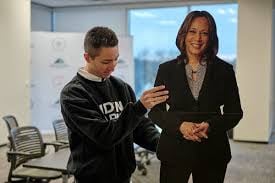
A cardboard cutout of Ms. Harris at a Democratic Party meeting in Nashville in February. Friends say she has started to let her guard down, invoking her personal story and the fact that she had made history as the first woman, the first African American and the first Asian American to serve as vice president.
She turned to old friends, who told her she had a power that members of Mr. Biden’s tight inner circle — predominantly made up of white men — did not. One friend recalled telling her that she was the only one in the room with Mr. Biden who could not be fired.
Friends say she started to let her guard down, invoking her personal story and the fact that she had made history as the first woman, the first African American and the first Asian American to serve as vice president.
On March 3, as Ms. Harris headed to Selma, Ala., to give a speech for the 59th anniversary of the Bloody Sunday attacks on civil rights marchers, she wanted to voice to the world what was weighing on her mind.
There were reports that weekend of families in Gaza eating leaves and animal feed, and the description of families who were shot by Israeli soldiers as they rushed a food convoy as “looters” had her stirring. She spent the flight making edits to her remarks, swiping her blue pen through page after page.
Ms. Harris had given a speech two years earlier at the Edmund Pettus Bridge in Selma, considered hallowed ground for the civil rights movement. Back then, she rallied a crowd around the message that the Biden administration was steadfast in championing civil and human rights.
This year, aides said, she believed that case would be harder to make. Mr. Biden’s support for Israel in its war in Gaza was causing outrage on the left, particularly in the crowd at Selma that empathized with Palestinians.
Her speech that day did not go beyond White House policy, but it was confrontational and an explicit acknowledgment of the human suffering the war had caused. Her speech made news for its focus on Palestinians and its implicit criticism of Israel.
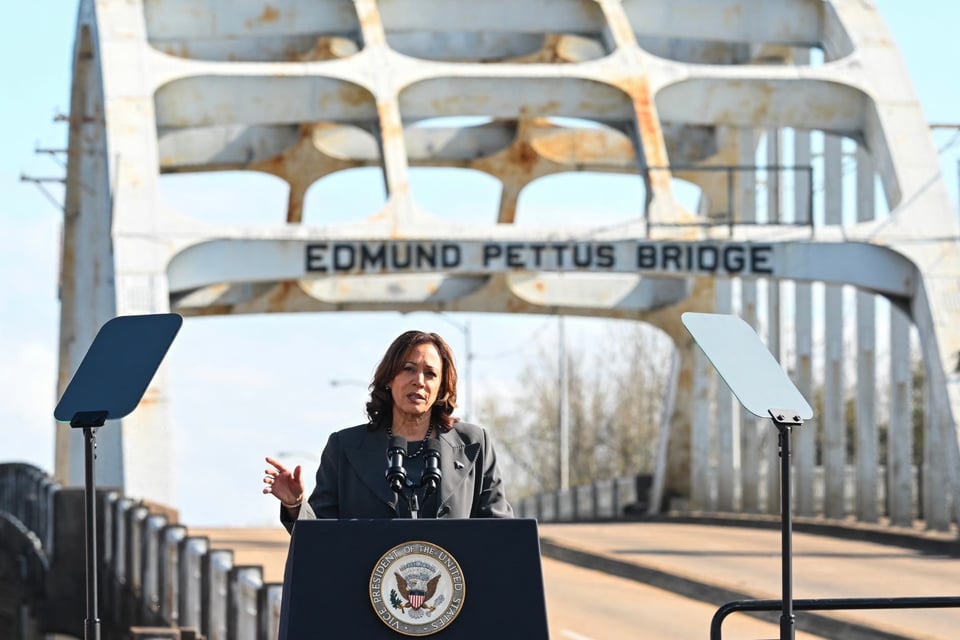
The vice president spoke on the 59th anniversary of Bloody Sunday in Selma, Ala., in March. In her speech, she demanded an “immediate cease-fire” in the war in Gaza, drawing cheers from the crowd.
“Our hearts break for the victims of that horrific tragedy and for all the innocent people in Gaza who are suffering from what is clearly a humanitarian catastrophe,” she said to resounding applause. “People in Gaza are starving. The conditions are inhumane. And our common humanity compels us to act.”
She also demanded an “immediate cease-fire,” drawing cheers from the crowd. She directed those remarks at Hamas, not Israel’s leadership, and repeated that she and the president remained “unwavering in our commitment to Israel’s security.”
“When she showed up in Selma, she was the Kamala we saw when she was a district attorney in the Bay Area,” said Maya Wiley, the chief executive of the Leadership Conference on Civil and Human Rights, who was in Selma. “We saw the Kamala who was an attorney general, we saw the Kamala who was cross-examining people as a senator.”
“She was all her human self,” Ms. Wiley said.
The vice president has also become the White House’s leading voice on abortion rights, a topic that Mr. Biden has never been comfortable talking about publicly.
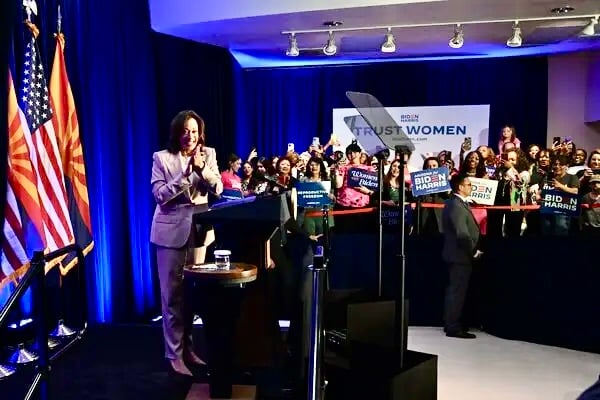
In recent months, Ms. Harris has been leaning more into how she has navigated a lifetime of often being the only woman of color in a room.
At an event in April, when Ms. Harris spoke of state bans on abortions that make no exception for rape or incest, she revealed that when she was in high school, a friend confided that she was being sexually abused by her stepfather.
That friend, Wanda Kagan, recalled in an interview that a 16-year-old Ms. Harris said, “Oh no, you’re going to come live with us,” before she had even asked her mother.
“I often reflect on where I would be had she not intervened in the most crucial time of my life,” Ms. Kagan said.
In May, the vice president was leaning more into how she has navigated a lifetime of often being the only woman of color in a room.
“When you walk in those rooms being the only one that looks like you, the only one with your background, you walk in those rooms chin up, shoulders back,” Ms. Harris said at a gathering of Asian American, Native Hawaiian and Pacific Islander groups.
“We have to know that sometimes people will open the door for you and leave it open. Sometimes they won’t. And then you need to kick that door down,” she added, using an expletive to make her point.
The Road to November
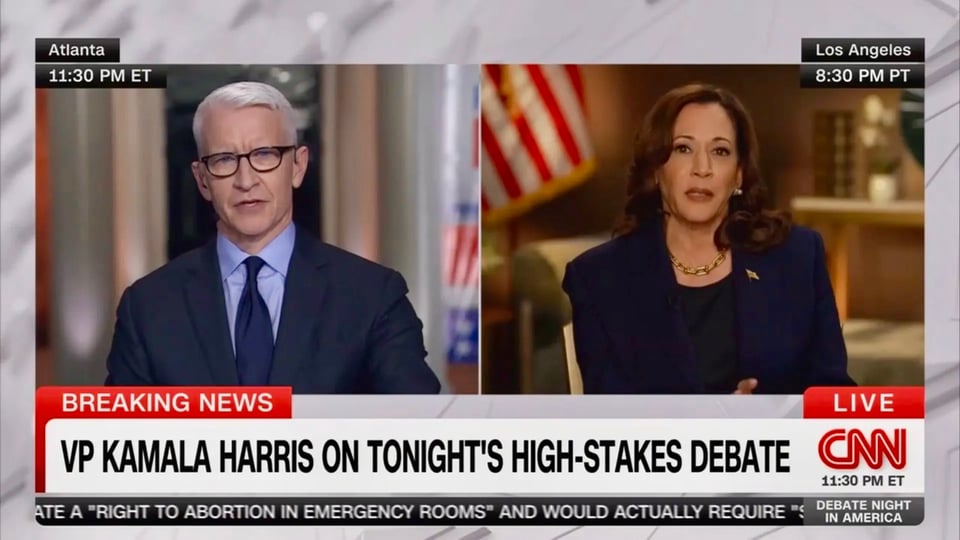
After the presidential debate on June 27, Ms. Harris strongly defended Mr. Biden
Soon after Ms. Harris appeared on CNN and defended the president’s debate performance last Thursday — “I’m not going to spend all night with you talking about the last 90 minutes when I’ve been watching the last three and a half years of performance,” she said — the cable network’s chief national correspondent, John King, weighed in.
In one indication of how the political conversation about Ms. Harris has shifted, he called it “political malpractice” that the White House had not made better use of her in the past few years.
She is hardly the first vice president whose readiness to become president has been questioned. But none of her predecessors served under a president as old as Mr. Biden or faced the kind of scrutiny that she has in recent days amid his stumbles.
After a campaign fund-raiser in California on Tuesday, Ms. Harris made clear that she stood by the president. When asked about the calls for him to drop out, she said: “Joe Biden is our nominee. We beat Trump once. And we’re going to beat him again, period.”
Asked whether she was ready to step in if need be, Ms. Harris said, “I am proud to be Joe Biden’s running mate.”
Still, there are deep reservations among many in the Democratic Party about her strength as a candidate. Republicans are already moving fast to discredit her.
“Kamala Harris is incompetent,” said Karoline Leavitt, a spokeswoman for the Trump campaign. “She’s proven to be the weakest, worst vice president in history, and she has 100 percent supported Joe Biden in every single disastrous policy that he has implemented over the last four years.”
Ms. Harris has also faced harsh criticism over immigration, a top concern of voters.
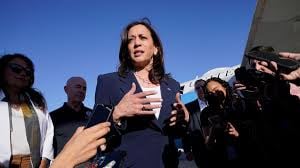
Ms. Harris on a trip to the U.S.-Mexico border in El Paso in 2021. She has become a favorite target on the issue of migration, one of the administration’s biggest liabilities.
Although Mr. Biden assigned her with addressing the root causes of migration — not specifically “securing the border” — she has become a favorite target for one of the administration’s biggest liabilities.
“VP Kamala Harris’s chief responsibility was securing the border,” Senator Tom Cotton, Republican of Arkansas, wrote on social media last month. “What a disaster. Harris is — by far —-the most unqualified, uninformed, and incompetent vice president in history.”
The White House has gone out of its way to express its confidence in Ms. Harris.
“The president’s trust in her, his reliance on the vice president, his respect for her judgment — that has only deepened and increased,” Jeff Zients, Mr. Biden’s chief of staff, said in an interview this year. “I think he really relies on her ability to get to the root of a problem,” he added. “And so often, she’s right.”
As for Mr. Biden, he suggests she is no longer “a work in progress.”
“My name is Joe Biden — I work for Kamala Harris,” Mr. Biden told a group in the Rose Garden in May. “I asked her to be my vice president because I knew I needed somebody smarter than me.”
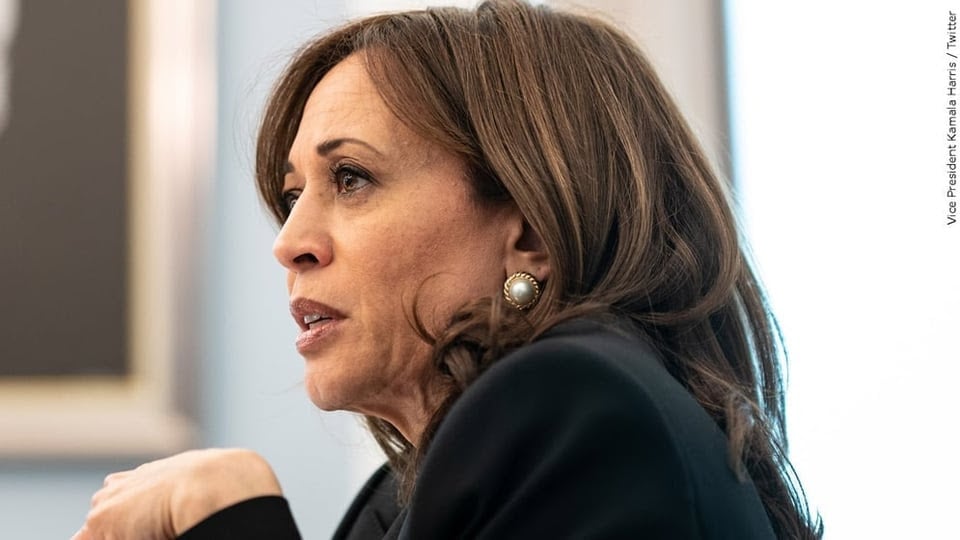
The White House has gone out of its way to expressm its confidence in Ms. Harris.
(New York Times).
Your Daily Reminder.
Trump is a convicted felon.
On May 30th, he was found guilty on 34 felony counts by the unanimous vote of 12 ordinary citizens.
The Convicted Felon Donald J. Trump was scheduled to be sentenced on July 11. He will now be sentenced sometime around September 18th.
https://x.com/nccaniac42/status/1810496025884340269?s=61&t=I_Od53CbnPTsbLcD0baXPg